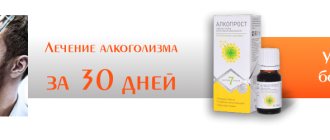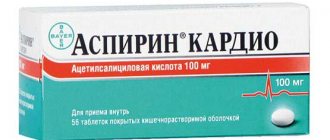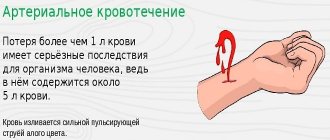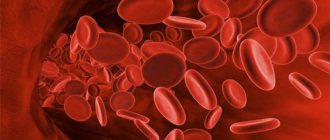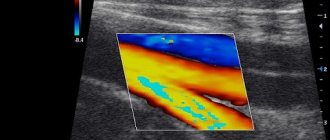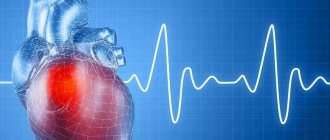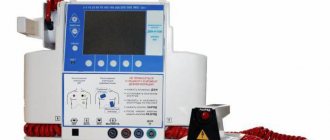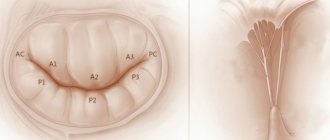Everyone knows that acetylsalicylic acid has a beneficial effect on the human vascular system and also helps strengthen the heart muscle. Therefore, for the treatment of cardiovascular diseases, doctors prescribe drugs whose main active ingredient is salicylic acid.
The most popular drugs among these are aspirin and Cardiomagnyl - the difference between them is practically unnoticeable and lies in the fact that Cardiomagnyl contains magnesium hydroxide, and Aspirin Cardio is coated with a film coating.
general information
Cardiomagnyl belongs to the group of antiplatelet drugs, which are rather used for the prevention of heart disease. This medicine can prevent the development of complications caused by such diseases.
Aspirin cardio is similarly a drug with an antiplatelet effect. This is a non-steroidal anti-inflammatory drug that is based on acetylsalicylic acid (ASA). At the same time, Aspirin Cardio is able to reduce high body temperature and exhibits an analgesic effect.
Heartache
Both drugs are designed to reduce platelet aggregation. In simple words, ASA can thin the blood, which has a beneficial effect on blood vessels clogged with harmful cholesterol. When the blood is too thick, it is difficult for it to move through vessels that are covered with atherosclerotic plaques. If such plaques begin to accumulate, then over time a blood clot forms in the vessel. This is what causes strokes and heart attacks. Another cause of stroke may be weak and fragile blood vessels.
Acecardole
The medicine Acecardol is a high-quality substitute for the drug Cardiomagnyl. The product belongs to the group of antiplatelet agents and contains acetylsalicylic acid. The generic medicine is produced by the Russian pharmaceutical company.
Acecardol, a cheap analogue of the drug Cardiomagnyl, is prescribed in the following situations:
- for the prevention of recurrent myocardial infarction;
- in the presence of high body weight and hypertension;
- after surgical operations on blood vessels;
- to prevent disturbances in the blood supply to the brain.
The Russian manufacturer produces Acecardol in two different dosages. The dosage regimen is regulated by the doctor depending on the indications. Patients often ask specialists the question of which drug is more suitable, Acecardol or Cardiomagnyl, and which is better. Reviews indicate the high effectiveness of each of these medications, but if the body is prone to erosive processes, doctors recommend purchasing Cardiomagnyl, which contains an additional substance - magnesium hydroxide.
Acecardol, as well as other analogues of Cardiomagnyl in Russia, have low prices. Medicines are sold in pharmacies without a prescription. The cost of Acecardol is 22 rubles.
How do they affect the body?
After taking the tablet, ASA is absorbed into the gastrointestinal tract at a high rate. When the direct absorption process occurs, ASA is transformed into its main metabolite - salicylic acid.
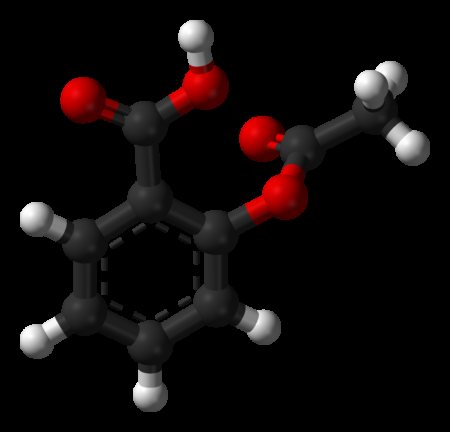
ASK
It is mostly metabolized in the liver, since this organ produces certain enzymes.
Attention! Absorption of the main substance in women occurs more slowly than in men. This is due to lower enzyme activity.
The peak concentration of ASA occurs within 10-20 minutes. If we talk about salicylic acid, it reaches peak concentration only after 30-120 minutes.
Cardiomagnyl tablets are coated with a protective coating that dissolves only in the duodenum, which slows down absorption.
Composition differences
Often patients simply do not know what the difference is between Cardiomagnyl and Aspirin Cardio. Most people think that they have identical composition, but this is not entirely true. Of course, the active ingredient in both drugs is aspirin, but that’s where the similarities end. Cardiolmagnyl is still considered more universal, since it additionally contains magnesium hydroxide - an antacid.
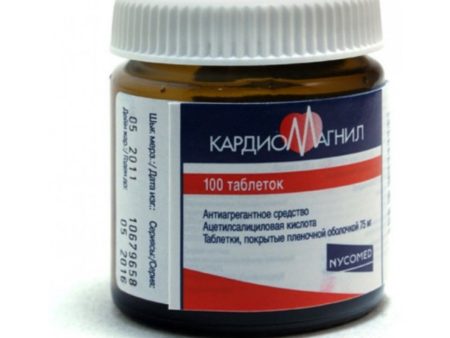
Cardiomagnyl
Magnesium hydroxide performs an important function - it envelops the walls of the stomach, protecting them.
Important! ASA can negatively affect the gastrointestinal mucosa. If taken incorrectly, serious pathologies of the stomach and intestines can develop, including exacerbation of gastritis or ulcers.
To prevent such a negative effect of acid, an antacid was specially introduced into Cardiolmagnyl, which provides protection to the mucous membrane. The capsule of this drug is covered with a special shell that is not exposed to gastric juice.
Features of treatment with Cardiomagnyl
Let's talk about Cardiomagnyl, its instructions for use, analogues, purpose, contraindications and potential harm.
Cardiomagnyl is produced in the form of tablets, 30 or 100 pieces per package. It is intended for those interested in the prevention of thrombosis and acute heart failure. It is prescribed to smokers, elderly people, diabetics, hypertensive patients, those who suffer from excess weight and unstable angina. This medicine is indicated for people who have had a heart attack or vascular surgery.
hypersensitivity to aspirin; predisposition to bleeding; ulcers in the digestive tract and stomach; severe impairment of kidney function; cerebral hemorrhage; age under 18 years; the first and third trimester of bearing a child (in the second - with great caution); aspirin bronchial asthma. How to drink Cardiomagnyl? Dosage depends on the disease and purpose of administration
How to drink Cardiomagnyl? The dosage depends on the disease and purpose of administration. The doctor calculates the regimen individually, but the standard rules for admission are as follows:
- for the prevention of cardiovascular diseases - 1 pc. (containing aspirin 150 mg) on 1 day, then half;
- as preventive measures against another heart attack and thrombosis, to prevent thromboembolism after vascular surgery, for unstable angina - 1 or ½ tablet (75 or 150 mg) once a day.
The instructions contain a warning that the drug often provokes allergies (cases of anaphylactic shock have also been recorded). The gastrointestinal tract also reacts to its use: heartburn, nausea, and rarely bleeding may occur. Side effects include bronchospasm and tinnitus.
The medicine costs 100-140 rubles.
Agrelide, Anopyrin, Aspecard, Dipyridamole, Clopigrel, Curantil, Magnicor, Trombo ACC have identical effects.
Cardiomagnyl and Aspirin Cardio are widely advertised drugs, but doctors warn: these are serious drugs that require serious treatment. Even if all your friends praise them, it is extremely unwise to accept them at your own discretion. Only a doctor can prescribe them, let alone cancel them. Any experiments with drugs that affect the composition of the blood can end very sadly.
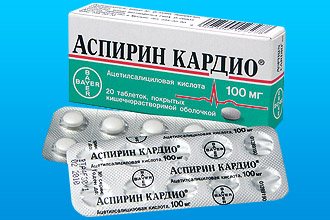
Read other interesting sections
- Privacy Policy
- Terms of use
- Copyright holders
- Adenoma
- Uncategorized
- Gynecology
- Thrush
- About blood
- Psoriasis
- Cellulite
- Ovaries
Indications
There is no point in using these two drugs at the same time, since they are both aimed at strengthening the heart. Cardiologists recommend treating problems with blood vessels with Aspirin cardio, and using Cardiomagnyl for general strengthening of the heart. It is not worthwhile to carry out independent treatment with these drugs; it is better to consult a doctor, who will prescribe a course of therapy.
Indications for use of these drugs:
- Prevention of thrombosis;
- Diabetes mellitus types 1 and 2;
- Unstable angina;
- IHD;
- Obesity;
- Problems with blood circulation in the vessels of the brain;
- Hypertension;
- Vascular atherosclerosis.
Some doctors prescribe these drugs during the rehabilitation period after myocardial infarction, stroke, or hypertensive crisis. Separately, they note that after surgical interventions on the arteries, it is still better to use Aspirin cardio, since this drug additionally reduces pain and inflammation.
Lopirel
The drug Lopirel belongs to the group of antithrombotic drugs and contains the substance clopidogrel, which is a powerful antiplatelet agent. The active component of the drug is able to prevent the occurrence of atherothrombosis in the presence of atherosclerotic phenomena in the vessels. Lopirel is a good remedy with a prolonged effect. The medicine is used for changes in the cerebral, peripheral, and coronary arteries.
Lopirel, an analogue of the drug Cardiomagnyl, is indicated in the presence of the following conditions:
- myocardial infarction more than a month old;
- acute coronary syndrome.
The medication is effectively used to prevent the development of thromboembolic complications.
Contraindications to the drug are:
- severe liver dysfunction;
- acute bleeding;
- lactose deficiency and intolerance;
- high sensitivity to components.
The cost of the drug Lopirel, an analogue of the drug Cardiomagnyl, is 279 rubles.
Contraindications
Cardiomagnyl or aspirin cardio - which is better for thinning the blood? Sometimes this question does not receive a proper answer, since for some groups of people these medications may simply be contraindicated. A number of diseases prevent the use of such drugs, so in this case it is appropriate to use analogues.
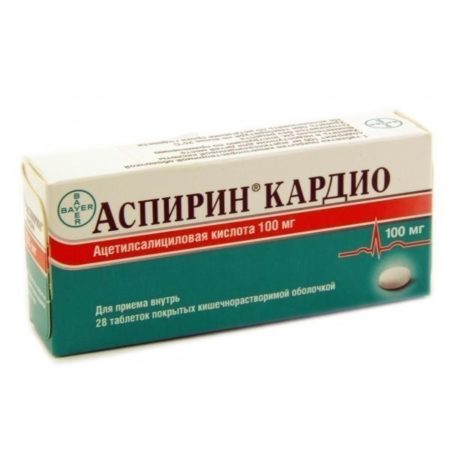
Packaging of the drug
The instructions for Aspirin Cardio indicate that it should not be taken if:
- Stomach ulcer;
- Duodenal ulcer;
- Perforated changes in the stomach;
- Bronchial asthma;
- Kidney and liver failure;
- Acute heart failure;
- Pathological blood conditions.
As for Cardiomagnyl, its effect on the mucous membrane is not so destructive, so it is acceptable to take it if there is no exacerbation of gastritis or ulcers. This exception is due to the presence of an antacid, which protects the mucous membrane from acid.
Absolute contraindications to taking Cardiomagnyl:
- Cardiac decompensation;
- Frequent bleeding (especially in people with high blood pressure);
- Kidney failure;
- Bronchial asthma;
- Diseases associated with blood clotting.
As a result, both drugs differ not only in composition, but also in contraindications. Therefore, safe use of such tablets is appropriate only with the permission of a cardiologist.
Both drugs should be used with caution if a person suffers from:
- Gout;
- Drug allergies;
- Sepsis;
- Chronic diseases of the respiratory system;
- Pathologies of the kidneys and liver;
- Hyperuricemia.
A woman in the second trimester of pregnancy should not take such drugs. Their appointment is permissible only after consultation with a doctor. Self-use can harm both the pregnant woman and the fetus. You should take ASA-based tablets with caution if the patient is awaiting surgery. ASA can strongly thin the blood, which can lead to prolonged bleeding.
Aspirin cardio and cardiomagnyl: what is the difference and what is more effective
These drugs have much in common; they significantly reduce the risk of blood clots, heart attacks and strokes. However, their indications for use are somewhat different. The final choice of medicine is made by the doctor, it depends on the results of the medical examination.
Aspirin is used prophylactically for the following diseases:
- Diabetes.
- Obesity.
- Predisposition to thromboembolism.
- Impaired cerebral circulation.
Taking Aspirin Cardio is recommended after surgical interventions on the heart and blood vessels. It is believed that due to the analgesic and anti-inflammatory effect, the drug reduces the number of complications, and the patient recovers faster from the disease.
Cardiomagnyl is recommended in the following cases:
- Myocardial infarction.
- Incidence of thrombus formation.
- Angina pectoris.
- Hypercholesterolemia.
This drug is used as a prophylactic agent for impaired cerebral circulation and for existing severe cardiovascular diseases.
Both drugs should not be taken by patients with gastrointestinal problems. In the absence of erosions or ulcerative changes in the stomach or duodenum, it is possible to use Cardiomagnyl. The antidote in its composition helps to significantly reduce the negative effects of acetylsalicylic acid on the walls of the stomach.
Taking Aspirin Cardio is contraindicated if you have a history of the following diseases:
- Bronchial asthma.
- Diathesis.
- Kidney and heart failure.
- Angina pectoris.
- High sensitivity to acetylsalicylic acid preparations.
The use of Cardiomagnyl is not recommended for:
- Predisposition to bleeding.
- Kidney failure.
- Peptic ulcer disease.
- Pregnancy (1st and 3rd semester).
- Lactation.
Aspirin is one of the most well-known and frequently used drugs in modern medical practice. Refers to non-steroidal anti-inflammatory drugs (NSAIDs), salicylates. The active ingredient is acetylsalicylic acid (ASA), first discovered more than a hundred years ago. It was originally used as an antipyretic medicine, and only in the 90s were its other properties studied.
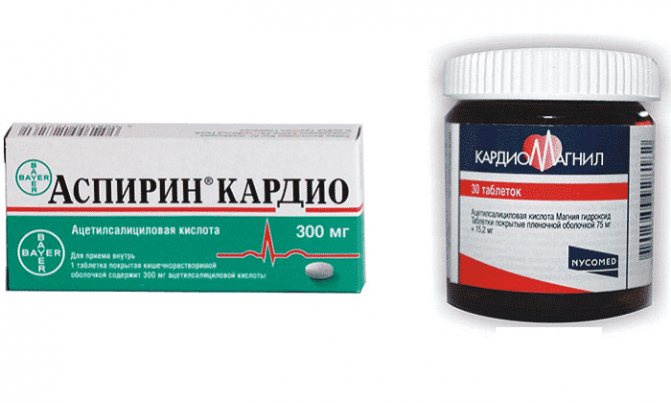
Currently, Aspirin is used as an analgesic (pain reliever), anti-inflammatory and antiplatelet agent. It is the gold standard for the prevention and treatment of cardiac and cerebrovascular complications. Official Aspirin Cardio is produced and released by the German pharmaceutical company Bayer.
The main mechanism of Aspirin is to stop the synthesis of arachidonic acid and prostaglandins (PGs). These biologically active substances are released in almost all tissues and have the greatest effect on pressure, vasospasm, the process of inflammation, swelling and pain. Acetylsalicylic acid, when released into the bloodstream, inhibits the synthesis of PG, thereby reducing the permeability of small blood vessels, and also reduces temperature and the inflammatory process.
In cardiological practice, aspirin has found its use as an antiplatelet agent. This is due to its effect on the substance thromboxane, which enhances the process of aggregation of red blood cells (platelets sticking together into clots and the formation of blood clots). The drug eliminates vascular spasm, expands the lumen of arteries, veins and capillaries. This allows Aspirin Cardio to be used as a therapeutic and prophylactic agent against thrombosis.
Indications
As a means to reduce risk:
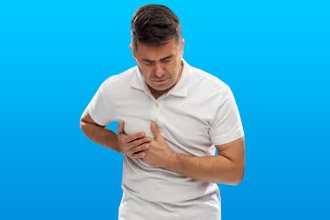
morbidity and death in persons who have previously suffered acute myocardial infarction (AMI);- for prevention in case of suspected acute coronary syndrome, AMI;
- with stable and unstable forms of angina;
- when detecting transient ischemic attacks (TIA) of the brain, stroke in a patient with TIA;
- for MI in persons with concomitant complications: diabetes mellitus, hypertension, dyslipidemia, obesity, smoking in older/elderly age.
As a preventive measure:
- embolism (blockage of the lumen of blood vessels), including the pulmonary artery, after surgery, catheterization, bypass surgery;
- thrombosis of the veins of the lower extremities, other vessels after surgery or prolonged immobilization (lack of mobility);
- for secondary prevention of stroke (cerebrovascular accident) in very high-risk patients with diseases of the cardiovascular and cerebrovascular systems.
The drug is available in oral form, in a dosage of 100 or 300 milligrams of acetylsalicylic acid. Additionally, the tablet includes: starch, cellulose powder, talc and other components. The package contains white pills in a blister film shell. A special feature of the drug is its enteric form, which minimizes the effect on the gastric mucosa.
When taken orally, the medicine is quickly and completely absorbed in the digestive tract, turning into the main metabolite - salicylic acid. Its minimum concentration is achieved within 20 – 40 minutes. Due to the special shell, it is released not in the acidic environment of the stomach, but in the alkaline pH of the intestine, due to which the absorption period is extended to 3 - 4 hours in comparison with regular Aspirin. During absorption, the drug quickly binds to plasma proteins and can penetrate the placental barrier and enter breast milk.
The process of metabolism of salicylic acid occurs in liver cells. Enzymatic reactions ensure the excretion of the drug, mainly by the kidneys and urine. The time depends on the dose taken, on average it takes 10–15 hours at moderate dosages of 100 mg.
Aspirin Cardio should be taken orally with plenty of water, without chewing. Recommended use half an hour or an hour before meals, once a day. According to the instructions, it is not indicated for use by children, especially under 16 years of age due to the high risk of side effects. The criteria and recommendations for adults are listed below:

Primary prevention of AMI is 100 mg every day, in the evening, or 300 mg every two days. The same regimen is indicated for individuals at high risk of coronary and cerebral complications.- To prevent a recurrent heart attack or in treatment regimens for stable/unstable angina, the dose is 100-300 mg.
- In case of an unstable course of an angina attack and a suspected heart attack, take 300 mg once, chew the tablet and drink a glass of water while waiting for an ambulance. The next month, the maintenance dose for the prevention of recurrent AMI is 200 or 300 milligrams under the constant outpatient supervision of a doctor.
- To prevent the development of stroke against the background of transient ischemic attacks, 100-300 mg per day is indicated.
- After surgery, 200-300 mg per day, or 300 mg every two days, is prescribed. Also, the medicine is intended for use by bedridden patients, or persons after treatment and prolonged immobilization (significantly reduced motor activity).
Contraindications
Persons with hypersensitivity to the components of the drug (acetylsalicylic acid) or other salicylates are contraindicated in taking Aspirin Cardio. It is also not recommended to take tablets if you develop an asthmatic or broncho-obstructive attack provoked by a drug from the NSAID group. Other criteria are listed below:
- Inflammatory or erosive diseases of the gastrointestinal tract (GIT). Gastritis, colitis in the acute stage or exacerbation.
- Condition after bleeding from ulcers; stomach ulcer.
- In the presence of hematological syndrome, diathesis with coagulation disorders and a tendency to bleeding.
- Tendency to seasonal allergies (including to drugs from the NSAID group), bronchitis, bronchial asthma, polyposis.
- Gout, high uric acid levels.
- Pregnancy or breastfeeding period.
- Children and teenagers under 18 years of age.
- Combined use with cytostatics (Methotrexate in a dose of more than 15 mg).
- Kidney and liver failure.
- Class III and IV heart failure (severe with congestion).
Side effects
On the part of the digestive system, the most common symptoms are general discomfort and the appearance of reflux of gastric contents (heartburn and sour belching). You may experience pain in the upper or middle abdomen. If there is a history of stomach ulcers, inflammatory or erosive diseases of the gastrointestinal tract, an exacerbation of the disease, severe pain, and bleeding is possible.
From the circulatory system. Taking Aspirin Cardio increases the risk of bleeding in people with hemostasis disorders, since salicylates have a direct effect on the process of platelet aggregation. Nasal, uterine or gastrointestinal bleeding may develop. Large blood loss during menstruation in women, in the postoperative period, which collectively leads to anemia.
From the nervous system, there is evidence of headache, dizziness, nausea, and unsteadiness when walking.
These tablets are classified as cardioaspirins. Despite the fact that they have many similar characteristics (they eliminate the danger of blood clots, prevent pathologies such as heart attack, stroke), they are still sometimes used to treat diseases that are different from each other.
Effect of drugs on pregnancy
Cardiomagnyl, or a similar drug - Aspirin Cardio - releases salicylates into the body. These substances in the first trimester of pregnancy can affect the development of the fetus. Often, such uncontrolled use can lead to the development of a baby’s heart defect and other pathologies, for example, cleft palate. For the first 3 months, taking analgesic drugs is contraindicated.

Taking pills during pregnancy
In the 2nd trimester, you can take such tablets only under the strict supervision of a doctor. Prescription is permissible if the benefit to the mother outweighs the risk to the child.
Attention! No studies have been conducted to confirm the safety of the drugs described, so it is impossible to assert their benefits during this period.
In the 3rd trimester, Cardiomagnyl and Aspirin cardio at high dosages are capable of:
- delay labor;
- provoke intracranial hemorrhage in a child;
- cause prolonged bleeding in the mother;
- prevent the closure of the ductus Botallova in a child.
If a simple analgesic drug is taken during breastfeeding, then in large doses it can also harm the baby. If the dose is one-time and in a small dose, then there is no danger to the child.
Side effects and overdose
The effectiveness of the drug depends on the individual clinical case. It is necessary to take into account the individual tolerance of additional components included in a particular medication and contraindications.
Cardiomagnyl Available Instructions
Health. Aspirin. Old medicine - new benefit. (25.09.2016)
Cardiomagnyl, which contains a low concentration of acetylsalicylic acid, is suitable for use for preventive purposes. Due to the presence of magnesium, it is advisable to prescribe the drug to improve the functioning of the heart, cardiac muscle, and for diseases of the cardiovascular system in patients with gastrointestinal pathologies.
Aspirin, characterized by a higher concentration of acetylsalicylic acid, is more effective in preventing the formation of blood clots, thromboembolism, and also after surgery due to its pronounced anti-inflammatory and analgesic properties.
The use of medications based on acetylsalicylic acid together with alcohol can provoke internal bleeding and erosive and ulcerative processes.
The instructions for the drugs contain special instructions that require careful study before starting to take them.
Please note that:
- The presence of aspirin in drugs can provoke bronchospasm, a complication of which will be an asthma attack. People with pathologies of the respiratory system need to be especially careful with cardioaspirins.
- Blood thinning medications increase the risk of bleeding.
- It is prohibited to take drugs simultaneously with anticoagulants and thrombolytics due to the high risk of blood loss.
- Long-term uncontrolled use can become an impetus for metabolic disorders and result in gout.
- The composition of both drugs can lower blood sugar. In patients with diabetes mellitus, simultaneous use with hypoglycemic drugs can cause serious consequences.
- Strict adherence to the dosage of the drugs is necessary, otherwise gastric bleeding may occur.
- Cardioaspirins are incompatible with alcohol - this combination is aggressive towards the mucous membrane of the digestive organs.
- It is forbidden to take Cardiomagnyl and Aspirin Cardio at the same time due to the risk of overdose of acetylsalicylic acid.
If necessary, these drugs are replaced with analogues from the group of antiplatelet agents, for example, Thrombo ACC.
Otherwise, the contraindications of both drugs are similar:
- bronchial asthma;
- renal failure;
- children under 15 years of age;
- pregnancy;
- severe cardiac decompensation.
Both drugs are generally well tolerated, but some patients may still experience some side effects. Allergic reactions often occur due to the patient's hypersensitivity to one of the auxiliary components. They manifest themselves in the form of hives, itching, redness, and swelling. In rare cases, taking one of the medications can trigger anaphylactic shock.
The gastrointestinal tract may respond to medications with nausea, abdominal pain, heartburn and vomiting. Gastric and duodenal ulcers rarely occur.
In addition, as a result of treatment with one of the medications, dizziness, decreased visual acuity, hearing loss, lethargy and clouding of consciousness may occur.
In conclusion, we can say that the drugs Aspirin Cardio and Cardiomagnyl are in many ways similar. However, they have slight individual differences and indications for use. It is based on these features in the action of the drugs that the doctor selects the one more suitable for a particular patient or replaces one drug with another if the therapeutic effect is not sufficiently pronounced.
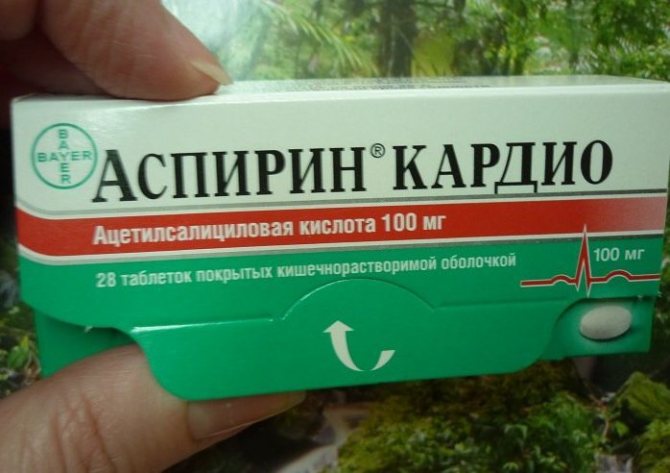
Aspirin Cardio - the effectiveness of tablets
The second remedy - Cardiomagnyl is used for:
- Ischemic disease of the vascular system of the brain, disruption of the normal functionality of blood flow.
- Other diseases of the vascular system and a tendency to thrombosis.
- Cardiac pathologies - unstable angina, ischemic heart disease due to circulatory disorders.
- Chronic diseases of the venous arteries, high blood pressure (hypertension).
- Thrombosis complicated by colds due to bacterial infections.
- Lesions of peripheral vascular systems (with stenosis, ischemia).
- Fetoplacental insufficiency in pregnant women, circulatory disorders that affect not only the mother’s body, but also the fetus.
Cardiomagnyl is prescribed by cardiologists to their patients if they have suffered a stroke, heart attack, or have disturbances in cerebral blood flow.
Aspirin Cardio is used for preventive purposes in the following cases:
- When the patient has metabolic disorders, endocrine diseases (obesity, diabetes, etc.).
- If there is a risk of cholesterol plaques.
- After a blood transfusion.
- During the rehabilitation period after surgical interventions.
- After a stroke, heart attack.
What is interesting is that for the above problems, Cardiomagnyl will also be effective.

Side effects of tablets
It is advisable to use the drugs only as prescribed by a medical specialist. After all, not all patients are recommended to take aspirin-containing medications. Some patients are suitable for other products with other components in the composition.
- In case of renal failure.
- In case of high sensitivity to any component contained in these tablets.
Aspirin Cardio should not be taken by patients with diathesis, asthma, patients with angina pectoris, or heart failure. The dosage form is not prescribed to adolescents under 15 years of age, pregnant women, and women undergoing breastfeeding.
Cardiomagnyl is not recommended for persons who are predisposed to bleeding of various etiologies, patients with ulcers, pregnant women of any stage and women who are breastfeeding.
Adverse reactions to cardioaspirins
Before you start using these medications, be sure to read the instructions and study the side effects of the medications.
Please note that these tablets can provoke the following conditions:
- With daily use of ASA drugs, bronchospasms may occur. Therefore, if you have respiratory diseases, consult your doctor about which drug is best to take so as not to harm your health.
- These tablets can cause bleeding, so they should not be used together with thrombolytics or anticoagulants.
- When using cardioaspirins more than the prescribed treatment regimen, the doctor may develop metabolic disorders and be complicated by gout.
- These drugs lower the level of glucose in the bloodstream. If the patient has diabetes mellitus, systemic therapy with hypoglycemic drugs may cause complications.
- Do not exceed the recommended dosage, otherwise there is a risk of bleeding in the stomach.
- The products are incompatible with strong drinks; such use has an aggressive effect on the gastrointestinal tract.
- You cannot use Aspirin Cardio and Cardiomagnyl together at once - there is a danger of an overdose of ASA.
Side effects
An ordinary antiplatelet drug can in some cases cause a deterioration in health. Side effects are especially pronounced if the dosage is not followed. Possible effects:
- nausea;
- vomit;
- bronchospasm;
- dizziness;
- rash and redness of the skin;
- tinnitus;
- anemia;
- rhinitis;
- anaphylactic shock (severe conditions).
At the first deterioration in your health, you should seek help from a doctor.
Drug analogues
Patients often decide on their own to buy an analogue of a familiar drug, because they think that there is not much difference in composition, but this is not the case. Some people pay attention to the lower cost of a similar drug, forgetting about possible contraindications or incorrect dosage.
Important! You can replace a prescribed drug with an analogue only with the permission of the attending physician.
Aspirin cardio is replaced with the following medications:
- Thrombo ass,
- Thrombopol;
- Aspicor;
- Upsarin oops.
In all of these drugs, the main component is ASA, but they all have different effects on the gastrointestinal mucosa.
As for Cardiomagnyl, it can be replaced with Magnicor and Combi-ask. These analogues can be easily compared in composition with Cardiomagnyl, since they have the same composition.
Cardiomagnyl - brief description
The main components of this drug are acetylsalicylic acid and magnesium hydroxide.
The effectiveness of the drug cardiomagnyl is due precisely to acetylsalicylic acid. The main effect of this component is the ability to influence the degree of platelet aggregation and block this process. The effect of magnesium hydroxide is to protect the mucous membrane of the gastrointestinal tract from the irritating effect of acetylsalicylic acid, as well as replenish the concentration of magnesium in the intracellular environment.
Permissible dosage
Aspirin cardio can be taken orally before meals. Take 1 tablet with plenty of water. Depending on the condition, a separate dosage for prevention is calculated:
- Acute heart attack – 300 mg per day;
- Unstable angina – 100-300 mg per day;
- Thrombosis – 100-200 mg per day;
- Stroke – 100-300 mg per day.
As for Cardiomagnyl, the difference in dosage is small. The difference is due to the presence of magnesium hydroxide in the composition, so it is appropriate to use it for the prevention of:
- IHD – 150 mg/day;
- Myocardial infarction – 150-450 mg/day;
- Thrombosis, coronary syndrome – 75 mg/day.
If Cardiomagnyl forte is taken, the dosage is halved.
